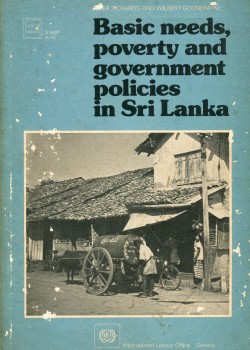
Basic Needs, Poverty and Government Policies in Sri Lanka
Author : Richards, P and Gooneratne, W.
Publisher: International Labour Office
Place of Publish: Switzerland, Geneva
Year: 1980
Page Numbers: 176
Acc. No: 4584
Class No: 339.46 RIC-SL
Category: Books & Reports
Subjects: Macroeconomics
Type of Resource: Monograph
Languages: English
ISBN: 92-2-102316-8
In this study, the authors find the arguments for a trade-off between welfare and growth unconvincing. Welfare policies had some negative and some positive effect on growth and employment. But of more importance in explaining Sri Lanka's performance have been various factors peculiar to the country. Welfare policies served to bring about a compromise between the conflicting interests of various groups in society and allowed traditional relationships, above all in rural areas, to continue unchanged. Slow growth on the one hand, could be traced back to a misplaced choice of policies such as a preference for import substitution and for controls in the face of foreign exchange restriction, over exports. Similarly agricultural investment policy has favored the development of large-scale and low-yielding irrigation schemes over, administratively more difficult, small-scale labor-intensive land development. The extensive private plantation sector failed to re-invest and raise its productivity, in the expectation of nationalization, and failed to stimulate alternative export products. This study was undertaken within the framework of the Income Distribution and Employment Programme. The authors represent the first systematic effort to investigate the impact of government policies on the satisfaction of basic needs and the alleviation of poverty in Sri Lanka.



